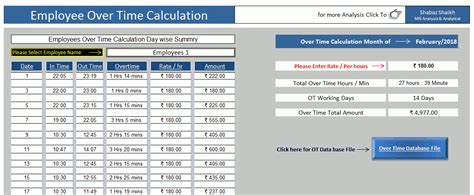Decoding Overtime Pay: Calculation & Overview

Are you aware of how overtime pay is calculated and what it entails? Understanding the intricacies of overtime pay is crucial for both employers and employees. Overtime pay refers to the additional compensation that employees receive for working beyond their regular working hours. It is important to know the rules, regulations, and calculations involved in overtime pay to ensure fair compensation and compliance with labor laws.
1. What is Overtime Pay?
Overtime pay is the additional compensation that employees receive for working more than a certain number of hours in a workweek. The purpose of overtime pay is to provide extra remuneration to employees who work longer hours, as they may experience increased fatigue and sacrifice personal time.
2. Calculation of Overtime Pay
The calculation of overtime pay varies depending on the labor laws of a specific country or state. However, a common method to calculate overtime pay is to multiply an employee’s regular hourly wage by a specific overtime rate. In most cases, the overtime rate is one and a half times the regular rate of pay.
2.1 Regular Hourly Wage
The regular hourly wage is the rate at which an employee is paid for their normal working hours. This rate is typically determined by the employment contract or collective bargaining agreement.
2.2 Overtime Rate
The overtime rate is the premium rate at which an employee is compensated for working additional hours. It is usually set at one and a half times the regular rate of pay. For example, if an employee’s regular hourly wage is $10, their overtime rate would be $15 per hour.
2.3 Calculation Example
Let’s consider an example to understand the calculation of overtime pay. Suppose an employee works 50 hours in a week and their regular hourly wage is $20. The first 40 hours are considered regular hours and the remaining 10 hours are overtime hours. The calculation would be as follows:
| Hours | Rate | Amount |
|---|---|---|
| 40 | $20 | $800 |
| 10 | $30 (overtime rate) | $300 |
| Total | $1,100 |
3. Overtime Pay Laws and Regulations
It is essential for employers and employees to be familiar with the overtime pay laws and regulations applicable to their jurisdiction. These laws define the maximum number of hours an employee can work in a week before qualifying for overtime pay, specify the overtime rate, and outline any exemptions or exceptions.
3.1 Fair Labor Standards Act (FLSA)
In the United States, the Fair Labor Standards Act (FLSA) is a federal law that governs overtime pay. According to the FLSA, non-exempt employees are entitled to receive overtime pay at a rate of one and a half times their regular rate of pay for any hours worked beyond 40 in a workweek.
3.2 State and Local Laws
While the FLSA sets the federal standards, some states and local jurisdictions have their own overtime pay laws that provide additional protections or impose stricter requirements. Employers must comply with both federal and state or local laws, whichever is more favorable to the employee.
4. Overtime Pay Exemptions
Not all employees are eligible for overtime pay. Certain exemptions exist based on job duties, salary level, and industry. These exemptions typically apply to executive, administrative, professional, and outside sales employees. It is important for employers and employees to be aware of these exemptions to ensure compliance with the law.
4.1 Executive Exemption
The executive exemption applies to employees who primarily perform managerial duties, supervise at least two employees, and have the authority to hire or fire employees.
4.2 Administrative Exemption
The administrative exemption applies to employees who perform non-manual work directly related to management or general business operations and exercise discretion and independent judgment in their roles.
4.3 Professional Exemption
The professional exemption applies to employees who work in a field that requires advanced knowledge, such as law, medicine, or engineering.
4.4 Outside Sales Exemption
The outside sales exemption applies to employees who regularly engage in sales activities outside of the employer’s place of business.
5. Conclusion
Understanding how overtime pay is calculated and the laws surrounding it is crucial for both employers and employees. It ensures fair compensation for employees and compliance with labor regulations. Employers should familiarize themselves with the overtime pay laws applicable to their jurisdiction and accurately calculate overtime pay for their employees. Employees should be aware of their rights and ensure they receive proper compensation for any overtime work they perform.
FAQs
1. How many hours can an employee work before qualifying for overtime pay?
Typically, employees must work more than 40 hours in a workweek before qualifying for overtime pay. However, this can vary depending on the labor laws of the jurisdiction.
2. Is overtime pay mandatory?
Yes, overtime pay is mandatory for eligible employees under most labor laws. Failure to provide overtime pay can result in legal consequences for employers.
3. Can an employer offer compensatory time off instead of overtime pay?
In some cases, employers may offer compensatory time off instead of overtime pay. However, this must be agreed upon by the employee and comply with applicable labor laws.
4. Are there any exceptions to overtime pay?
Yes, there are exceptions to overtime pay based on job duties, salary level, and industry. These exemptions typically apply to executive, administrative, professional, and outside sales employees.
5. What happens if an employer fails to pay overtime?
If an employer fails to pay overtime, employees may file a complaint with the labor department or take legal action to recover the unpaid wages.
